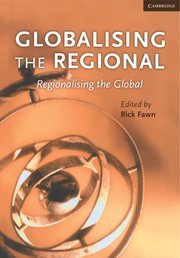Book contents
- Frontmatter
- Contents
- Preface
- Notes on contributors
- ‘Regions’ and their study: wherefrom, what for and whereto?
- Theoretical and thematic approaches
- Regional cases
- The resurgence of the ‘region’ and ‘regional identity’: theoretical perspectives and empirical observations on regional dynamics in Europe
- 6 The contradictions of regionalism in North America
- Latin America: contrasting motivations for regional projects
- The Southern African security order: regional economic integration and security among developing states
- East Asian regionalism: much ado about nothing?
- The Commonwealth of Independent States: an example of failed regionalism?
- Index
East Asian regionalism: much ado about nothing?
Published online by Cambridge University Press: 05 June 2012
- Frontmatter
- Contents
- Preface
- Notes on contributors
- ‘Regions’ and their study: wherefrom, what for and whereto?
- Theoretical and thematic approaches
- Regional cases
- The resurgence of the ‘region’ and ‘regional identity’: theoretical perspectives and empirical observations on regional dynamics in Europe
- 6 The contradictions of regionalism in North America
- Latin America: contrasting motivations for regional projects
- The Southern African security order: regional economic integration and security among developing states
- East Asian regionalism: much ado about nothing?
- The Commonwealth of Independent States: an example of failed regionalism?
- Index
Summary
Abstract. East Asia has emerged over the last decade as the most active site for the negotiation of regional inter-governmental collaboration. The primary focus has been on trade but, in the wake of the financial crises, governments have also engaged in historically unprecedented collaboration in several areas of finance. Multiple factors have driven this new regional engagement. Although the agreements have been primarily economic in their focus, the primary motivation for many of them has been to secure diplomatic or strategic gains. The aggregate benefits from the agreements are likely to be limited given the low levels of tariffs and the availability of provisions that facilitate the intra-regional exchange of components. They may, however, be of significant interest to producers of specific products either because they provide advantage over competitors (or remove the advantage that competitors through agreements that their governments have signed). The trade agreements thus often reflect particularistic interests that governments have been enlisted to champion.
Introduction
East Asian regionalism came of age with the financial crises that swept across the region in 1997–98. For the first time, states agreed to the creation of a genuinely region-wide inter-governmental institution. The ASEAN Plus Three (APT) grouping came into being in December 1997 when the leaders of ASEAN met with their counterparts from China, Japan and Korea on the sidelines of the Second ASEAN Informal Summit, and was institutionalised when the leaders issued a Joint Statement on East Asia Cooperation at the Third ASEAN Plus Three Summit in Manila in 1999.
- Type
- Chapter
- Information
- Globalising the Regional, Regionalising the Global , pp. 215 - 236Publisher: Cambridge University PressPrint publication year: 2009
- 1
- Cited by



